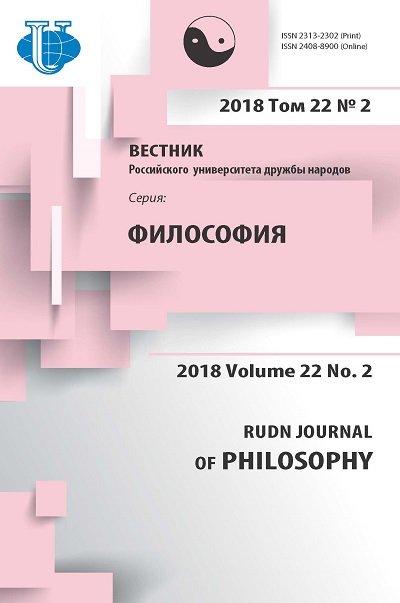Comparative analysis of values of Russia and Europe in the context of the issues of existential safety
- Authors: Baeva LV1
-
Affiliations:
- Astrakhan State University
- Issue: Vol 22, No 2 (2018)
- Pages: 183-196
- Section: SOCIAL PHILOSOPHY
- URL: https://journals.rudn.ru/philosophy/article/view/18713
- DOI: https://doi.org/10.22363/2313-2302-2018-22-2-183-196
- ID: 18713
Cite item
Full Text
Abstract
The article is devoted to the study of value orientations system in modern society in the context of globalization and intercultural communication in the open, informational world. The understanding of values and value dynamics is based on the possibilities of the existential-axiological approach, which in this case is used to study traditional and liberal (emancipative) values. The methodology of the study is represented by an existential approach to understanding values and by the method developed by R. Welzel C. Inglehart, for the study of modern sociocultural and political values. A comparative approach was implied to the study of the individual and social values of several European countries and Russia. The study has been done on the basis of a secondary analysis of the World Values Survey results. The sample included population of Russia and the European countries that participated in the WVS. The survey examined the population’s attitude to religion, family, work, political life, health, etc. Based on these data, features of manifestation of the European traditional, secular-rational and self-expression values are shown. The data in the European countries, gathered by the World Values Survey and the study of Happiness Index in 2016, were correlated. The author concludes that countries with a high Happiness Index show the high level of emancipative values. At the same time, it was revealed that some traditional values play an important role in the modern system of human values and are in a hybrid relationship with liberal landmarks. The values of self-expression turned out to be related to the existential security of a person in the conditions of crisis of a family as a social institution and weakening of social ties in postindustrial societies.
About the authors
L V Baeva
Astrakhan State University
Author for correspondence.
Email: baevaludmila@mail.ru
-
20a Tatischev Str., Astrakhan, Russia 414056References
- Frankl, V. Man’s Search for Ultimate Meaning. (A revised and extended edition of The Unconscious God; with a Foreword by Swanee Hunt). Perseus Book Publishing, New York, 1997.
- Levinas, E. The contemporary Criticism of the Idea of Value and the Prospects for Humanism. Value and Values in Evolution. New York, 1979.
- Maslow, A. The Psychology of Science: A Reconnaissance, New York: Harper & Row, 1966; Chapel Hill: Maurice Bassett, 2002. p. 89.
- Hofstede, G. Cultures and organizations: software of the mind. 1991, London: McGraw-Hill.
- Inglehart, R. & Welzel C. Modernization, Cultural Change, and Democracy: The Human Development Sequence. Cambridge: Cambridge UP, 2005.
- Welzel, C. & Inglehart, R. F. Misconceptions of Measurement Equivalence: Time for a Paradigm Shift. Comparative Political Studies, 2016;49(8): 1068—1094.
- World happiness report of 2016. http://worldhappiness.report/wp-content/uploads/sites/2/2016/ 03/HR-V1_web.pdf.
- World Values Survey http://www.worldvaluessurvey.org/WVSOnline.jsp.
- Inglehart, R. Political values. In J. W. van Deth (Ed.), Comparative politics: The problem of equivalence (pp. 61—85) European Consortium for Political Research Press, (2013).
- Ariely, G., & Davidov, E. Can we rate public support for democracy in a comparable way? Cross-national equivalence of democratic attitudes in the World Value Survey. Social Indicators Research. 2011; 104(2), 271—286.
- Arzheimer, K. Contextual Factors and the Extreme Right Vote in Western Europe, 1980—2002. American Journal of Political Science. 2009; 53(2): 259—275.
- Milfont, T.L., Bilsky, W. Cross-cultural Evidence of Value Structures and Priorities in Childhood. British Journal of Psychology, 106(4): 675—699
- Inglehart, R. & Welzel C. (2005) Modernization, Cultural Change, and Democracy: The Human Development Sequence. Cambridge: Cambridge UP.
- Magun, V., Rudnev, M., & Schmidt, P. Within-and-between-country Value Diversity in Europe: A Typological Approach. European Sociological Review. 2015; 32(2): 189—202.
- Haerpfer, CW., & Kizilova, K. Support for Democracy in Postcommunist Europe and Post-Soviet Eurasia. The civic culture transformed. From allegiant to assertive citizens. Cambridge University Press, 2015.
Supplementary files















